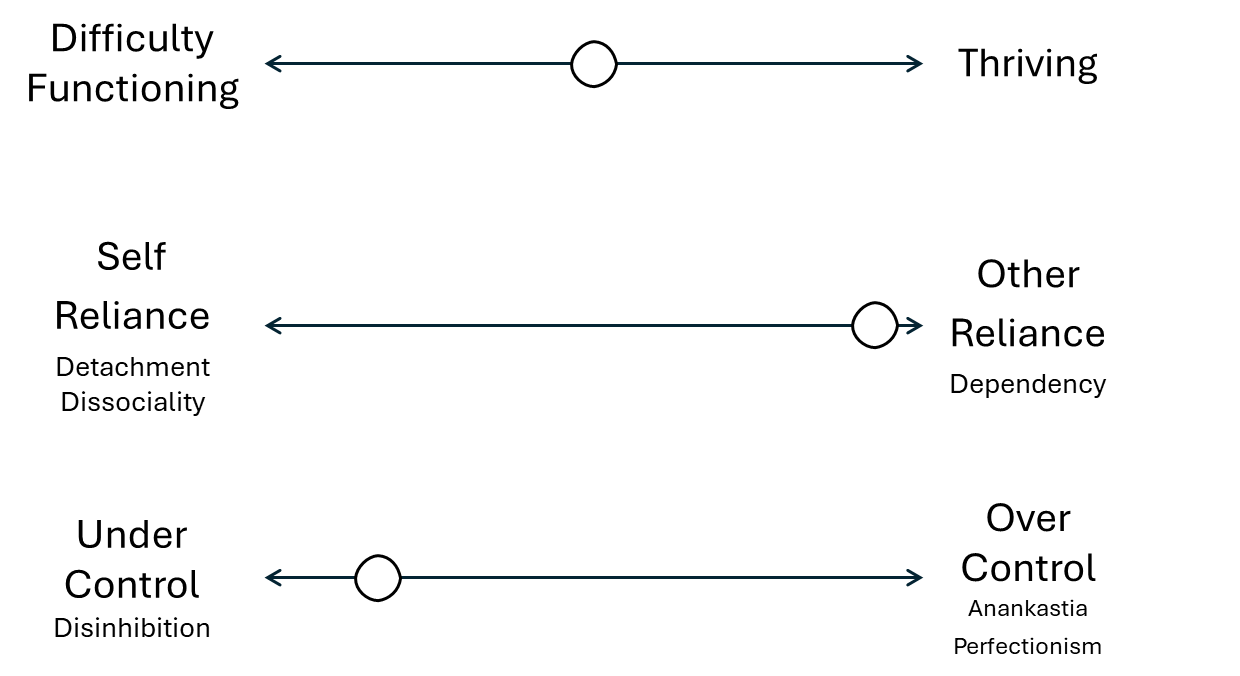👉 We react and respond to difficulties in our sense of self and relationship with others in a spectrum of ways, which can reflect the ‘health’ of our personality.
In this lesson we’ll talk about how experts describe a healthy personality, and take this chapter to talk about…broadly…the steps to self actualization: getting from wherever you are today to where you want to be.
Development of Sense of Self
The core of the sense of self is the level of agency we experience. In survival mode, we feel like we have no agency. The world happens to us, and we just react instinctively.
As we escape survival mode, we start to develop a sustained sense of self (identity). As this identity comes into focus, we develop clarity about who we are and healthy boundaries between self and other — what we can and can’t control in the world.
As our identity forms, we start to trust that we can consistently meet most of our needs in the world (self-esteem) and develop a realistic assessment of where we excel or are challenged (self-reflection). With agency and accurate self assessment, we develop the ability to set appropriate or meaningful goals for ourselves and achieve them on a consistent basis (self-actualization).
Development of Relationships with Others
🪞Our sense of self and sense of others are mirror images of one another. If we don’t feel agency, we have a hard time seeing others as agents themselves, and find ourselves generally disinterested and lacking curiosity about their internal states.
In survival mode, therefore, others, like ourselves, are more objects than people — they are instruments that help or hurt us. We have a hard time building models of other’s needs, wants and intentions (empathy) because we don’t really have a model of our own. With limited empathy, others seem as out of control and unpredictable as ourselves, making it difficult to trust and depend on (intimacy).
As we develop a sense of our own agency and identity, we start to develop more nuanced models of other people too. We find people more comprehensible and predictable, and find that we can trust and depend on some of them, allowing us to form close connections and intimate relationships.
In survival mode, conflict with others is us vs. them – feeling like a zero sum game where only one person wins: the goal is to avoid the fight or win by any means necessary. As we get out of survival mode, conflicts are no longer an all-out war but an invitation for collaboration. Conflicts are the natural consequence of living and working in close proximity with others. Others with their own agency, and needs, wants and desires that differ from our own. Conflicts are fought to improve relationships, rather than to destroy the enemy, allowing them to be constructive rather than destructive.
Functional Impairments
People respond to and compensate for their impairments in their self and other functioning in multiple ways. Below are three common axes to consider:
➡️ Idealization / dependence on self vs. other
Detachment - distancing oneself from others and limiting emotional expression
Dissociality - not getting along well with others, including selfish behavior and lack of empathy and guilt
Dependency – over investment and involvement with others
➡️ Overcontrol vs. undercontrol
“Anankastia” - overcontrol of behavior and perfectionism
“Disinhibition” - acting without thinking in ways damaging to self and others
🤔 Reflection of the Day: Where would you place yourself on the parameters above?


